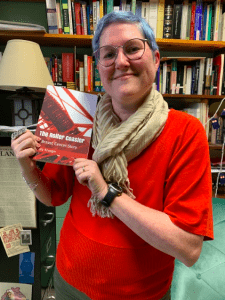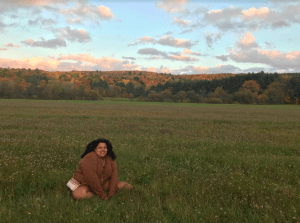
Nov 21, 2019 | Exclusive |
Faith Diaz Contributing Writer
Associate Professor of English, Misty Krueger, recently released her new memoir, “The Roller Coaster: A Breast Cancer Story.” Her collection traces her breast cancer journey in various pieces of prose, poetry, and essays.
The book was written over the course of Krueger’s discovery of her cancer, her diagnosis, appointments, surgery, and more. Different pieces of the text range in times of their creative origin, some having been written in real time as they were happening to her or as reflection after the events had passed.
“Roller Coaster,” according to Krueger, “traces a year in the life of a cancer patient, particularly someone with breast cancer and the treatment that she, I, received and how I dealt with that as a life changing experience.”
As the reader moves through the text, the story traces a linear timeline of Krueger’s life via realizations she has about her body. From being a young woman who did not consider the possibility of physical pieces of her body being removed, to an adult put into the place of having to make many quick decisions in order to save her life.

Misty Krueger with her self-published book, now available on Amazon (Photo courtesy of Faith Diaz)
“I follow that course through my decision to have or not have reconstruction, to have or not have chemotherapy, undergo radiation, to go on medical leave, and then the fall out of that whole experience combined,” Krueger said.
She described the mental toll that the experience took on her and the common misconceptions that the general public has about what it was like to live inside of a body that had cancer. “It is the whole person that is affected; its body, spirit, soul, mind, it’s everything.”
The story traces through all of these facets of Krueger as well as her teaching career at UMF. “I feel I would not have made it through this experience without the support from UMF,” she said.
When she was diagnosed in early 2018, a smaller group immediately took to showing Krueger how much they wanted to support and care for her throughout this difficult time in her life. She said, “People were reaching out to me and doing this in material ways like bringing me cookies, putting signs on my door, sending me cards, and also you know just telling me, ‘We’re here for you,’ ‘We love you,’ and ‘No matter what, you’re going to make it.’”
Krueger cites this positive energy, teaching, her family and more as being essential to her healing process. Her dedication to loyalty to these elements of her life were obvious in her pursuit to keep them close to her throughout her illness. “I knew that, that community would actually give me strength but, it turns out, my body was stronger than my will.”
As her illness progressed, Krueger grew weaker and against her usual ambitious nature, her teaching performance was affected. “I taught a month into the fall semester of 2018 and I just woke up one morning and knew I couldn’t do this to myself anymore or my students,“ Krueger said. “I wasn’t giving them the Misty Krueger experience.”
Through these series of realizations about what her illness meant for the other factors of her life, the UMF community stayed right by Krueger’s side even after she stopped teaching on campus. “I saw people from campus, they’d either come to me or I’d come here and mostly it was social media that really kept that community alive for me.“
Krueger heard from her friends, students and colleagues alike through social media like Facebook and Twitter. Even when she could not physically see her friends due to treatment they continuously made sure she got their message. “I just felt so loved. I felt excited to come back.”
That excitement stayed with Krueger as she survived her illness and began her recovery.
“It helped me get through radiation which I was going through as I was teaching and the transition to the drugs that I have to take for 10 years to stave off the cancer. Being here helped me get through that. I can’t tell you how grateful I am for everyone here,” Krueger said.
During her treatment and upon her arrival back into the UMF community in the spring of 2019, Krueger had been continuously writing about her experience with breast cancer, for which she found a wealth of support to publish her work.
Upon the book’s release, an education class utilized the text as part of an in-class analysis. On Nov. 6, Krueger visited class to talk about her experience and answer any questions that students may have had.
Students were intrigued by how Krueger could publish something that had detailed descriptions of her body and mind, and were awed at how she could be so vulnerable on the page. One student, Christine Destephen, asked, “How did you deal with putting the book out and exposing yourself?
Krueger said, “I will tell you my husband did not want me to write this book. He said, “This is too much, you are exposing yourself, You are going to let people read this? Especially strangers?’”

Misty Krueger’s self-published book, now available on Amazon
It was more than the idea of strangers reading her work that concerned Krueger’s husband. “Even worse for him was people we knew because he thought, ‘Strangers can read it, that’s whatever. The people you know, now they really know you, stuff about you they don’t want to know, are afraid to know, stuff that might traumatize them.’”
Krueger still wanted to write the book because she thought that in a way, that was exactly the point. “If we don’t talk about these things, if we keep all of this stuff a secret, then no one else will talk about it and we are all suffering alone,” she said.
As the class continued to ask their questions it was obvious that Krueger’s unique story was not only about her anymore, as she said, “It is about me and my story but there are other peoples’ lives that come into play because they are close to me.”
And with that closeness, for those that have since read her book, there are lives that have been affected and people that have found pieces of themselves within Krueger’s pages.
An unnamed student in the course had struggled with her own surgery and illness of a Cardiovascular variety and found Krueger’s description of coming out of surgery in this surreal wonder and uncomfortable state of surprisingly being alive, to be a spot-on representation of the experience. She ended her comment to Krueger simply with, “Thank you for writing this book.”
Krueger’s self-published book can be purchased on Amazon.

Oct 24, 2019 | Exclusive |
Faith Diaz Contributing Writer
Post-Doctoral Fellow in Digital and Public Humanities, Stephen Grandchamp, will teach ENG 377: Hip Hop History and Culture, for the Spring 2020 semester. The course is offered as an English and Music History Course and will be an examination of the history of the genre and a cultural analysis of the music and its effect on American history.
Grandchamp also intends to explore the genre’s evolution. “You might get more misogynistic party tracks in there but then you might get tracks in there from more female assertive rappers like going back to MC Light or Lauryn Hill, up to contemporary rappers like Nicki Minaj, Cardi B, Megan the Stallion, City Girls.”
He wants to clarify the cultural understanding of the genre as he said, “We’ll put all these different treatments of a theme side by side and talk about how they are relating and making connections and try to figure it out. Because Hip Hop is not monolithic in that it has one take on everything.” He continued, “I want students to be aware of some of those voices that have been marginalized.”
Students will also be exposed to the voice of a local underground rapper, Chris Brown, whose stage-name is Yung Breeze, and who is also the younger brother of Vanessa Brown, a UMF senior and TA for the course.
“I first talked about my brother and his music to Steve last semester during the New Commons course, and from there I sent some of his music along,” Brown said in messages. “Steve thought it’d be a great idea to talk about my brother as a local underground rapper and to have him be a part of the curriculum.”

Vanessa Brown, TA for the Course (Photo courtesy of Vanessa Brown)
“I thought it was awesome that [Grandchamp] brought that idea up,” she continued, “mainly because my family and music are so intertwined, and to watch and celebrate my brother’s hard work in an academic setting is an accomplishment in itself.”
The course is intended to breed further discussion on the cultural effects Hip Hop has had on the American society as a whole. “One of my main arguments about Hip Hop,” said Grandchamp, “is that you need to view it as a regional United States genre where in the local scenes of San Francisco, Los Angeles, Houston, New Orleans, Miami, Atlanta, Memphis, all of these different places have really vibrant hip hop scenes that have unique characteristics that differentiate them from all of the other ones.”
To better understand the unique principles and craft of each scene, students will create their own Spotify playlists based off of those scenes that will serve as a one to two hour premier for the general listener. Students will submit an essay alongside the playlist to explain why they chose these songs, the implications of those inclusions, and key themes.
The course’s main challenge lies in altering students perceptions of Hip Hop and its place in modern academia. “I would say it’s as controversial now as it’s ever been because of its willingness to take on taboo subjects in a really direct way, so race, class, gender, and politics. These are issues that are at the surface of Hip Hop music and we are not going to steer away from that,” Grandchamp said. “You have to get students to buy in to applying literary analysis processes to contemporary Hip Hop lyrics.”
Grandchamp is excited overall for the course. “If you take the class, be ready to listen enthusiastically. One of the main tasks of the course is just to get students to listen to the primary text which are the recordings of the genre to better understand it.”
Another goal of his is to prepare students to, “meet the music on its own terms. In that, Hip Hop is an art form that was birthed out of African American culture. So its is inextricably linked to African American culture. So I am going to ask students to meet that culture on its own terms. To try to confront it directly, analyze it directly, and really try to figure out where this artistic movement came from and whats the engine behind it.”
Brown hopes to aid students’ engagement with the music and culture by acting “not only as a sounding board for thoughts, ideas, and other things. . .during discussions and projects,” she said, “but also engage and share experience and/or my music insight from the hip-hop world.”
This course is now available for pre-registration on My Campus.
Oct 10, 2019 | News |
Zion Hodgkin Contributing Writer
English professor Sabine Klein sits in the small chair in the corner of her office, going over the information she’ll be discussing in her upcoming talk at UMF. “It’s about Norridgewock, well, specifically the horrific massacre of Native Americans that happened there. My talk is about the way that we sort of keep the memory of Norridgewock alive and why we do it.”
Klein will be giving her talk at the Emery Arts Center, on Oct. 23 at 11:45 a.m. It will be hosted by the New Commons Project, a group dedicated to looking at culture, both of the past and the present. Professor of English Kristen Case, the head of the New Commons Project, will be introducing Klein and discussing some of her accolades.
“She is a scholar of early American literature, her area of expertise is pre-colonial literature of the Americas,” Case says, “she really is an expert in this time period and in this region. Even though she’s an English professor here, her work is very historically informed. A lot of uncovering, and re-reading historical texts of all kinds, in order to be aware of more than one narrative about a specific moment in time.”
In learning about historical events, locally or on a global scale, it is generally difficult to escape a one-sided view of the events that transpired. It harkens to the age old saying, “History is always written by the winners.” Klein wants to simultaneously explore that concept when thinking about the local tragedy, and expand upon the awareness that students have of the event.
“What I realized is that we have this place of a massacre. . .but what’s even more interesting is the way that different communities have used the massacre to talk about the past,” she said.
“I’m going to talk about some of the monuments and literature that were affiliated with or written about that particular place in the 19th century. But, what’s interesting,” She grins a little to herself before adding “again, is that what happens in the 1820’s and 1830’s is that there’s an attempt to solidify American identity.”
“But the way that it’s being done is by basically writing about Indians, but writing about Indians as sort of the people, well” she pauses for a second, collecting her thoughts, “it’s the vanishing Indian trope. So this is the idea where people at the time were like ‘oh my god it’s so sad,’ and so you have this nostalgia of all the bad stuff that happened, but that nostalgia is a way of celebrating the new nation.”
Klein wants to explore how the memorialization of the massacre “serves Americans of English descent, versus Americans of French descent, versus Native Americans.” Each of the groups’ ancestral lines were directly involved in the massacre, and Klein will analyze how each of these groups of people are subsequently benefitting from the way the event is remembered, or not remembered.
Cali Turner, a student and an active member of the New Commons Project, is interested to see what the event has to offer, and wants to learn more about how people are affected by the different ways in which a story is told and remembered.
“I’m excited just to be able to further my education on the area I’m in,” Turner says, “I’m from Maine, but I’m not from Farmington, and it seems like especially with the other things we’ve been doing in New Commons, I think it’s important to be learning about the history, like the land and the people, and to be aware of some of the darker parts about it, because I didn’t even know that the Norridgewock Massacre was a thing.”
Turner also speculated about how historical events are remembered, and the way details are made available about those events. “I think our generation has gotten a bit better at being able to see all sides of an event,” she says, “I think for a long time people were only really able to learn by what they read from one history book, and now, because of how we were raised and because of our access to the internet, more recent generations have developed their own opinions.”
She continued, “We’ve gotten to the point now that most of us understand what’s okay and what isn’t. Or at least to where we can see multiple sides of an event, and know that what one source is saying, isn’t always the entire story.”
This semester, the New Commons Project is focusing specifically on Native history and issues in the state of Maine, and Klein’s talk will target an incredibly important and defining moment in Native history, very close to home.
Case thinks this event will be a “great opportunity for people who are interested in the history of this region, particularly the Native history of this region, to learn about one of the pivotal moments in that colonial time period. Learning about that history is vitally important in efforts to recognize the presence of the Abenaki in this region, not only then but also today.”


